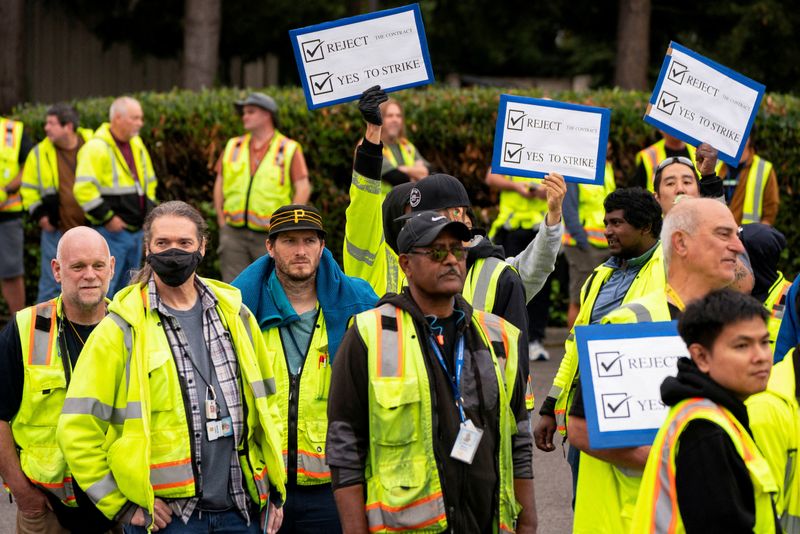Boeing and union negotiators to resume talks next week amid strike, federal mediators say
By Joe Brock and David Shepardson
SEATTLE (Reuters) -Boeing and union negotiators will return to the bargaining table early next week, U.S. federal mediators said on Friday, as the two sides try to end a strike threatening the airplane maker's turnaround.
The U.S. Federal Mediation & Conciliation Service late on Friday said it was convening the parties with a federal mediator after speaking to both sides, less than a day after union members voted by a huge majority to reject Boeing (NYSE:BA )'s contract offer and went on strike.
"The parties will resume meetings early next week," it said in a statement.
More than 30,000 members of the International Association of Machinists and Aerospace Workers (IAM) who produce Boeing's top-selling 737 MAX and other jets in the Seattle and Portland areas voted on their first full contract in 16 years, with 94.6% rejecting Boeing's offer and 96% favoring a strike. Workers vowed to fight for a better pay offer than the company had made.
Shortly after midnight on the West Coast, striking workers started to gather outside Boeing factories in the Seattle area.
Chief Financial Officer Brian West said Boeing wants to get back to the negotiating table, saying the walkout will make it harder for the plane maker to meet the production target for the 737 MAX jet and stabilize its supply chain. The union was also eager to return to the table as quickly as possible.
"This is about fighting for our future," said Jon Holden, who headed negotiations for Boeing's largest union before announcing the strike vote result on Thursday.
Boeing declined to comment on the mediator's comments and the union was not immediately available for comment.
Workers have been protesting all week in Boeing factories in the Seattle area that assemble Boeing's MAX, 777 and 767 jets. On Friday evening, members in the union hall cheered and chanted "Strike! Strike! Strike!"
Boeing's stock fell 3.7% on Friday. It has tumbled almost 40% so far this year, slashing the company's market value by roughly $58 billion. Boeing's corporate bonds also lost value, with spreads between their yields and comparable U.S. Treasuries widening sharply.
A long strike could further damage Boeing's finances, already groaning due to a $60 billion debt pile. The planemaker needs to generate sufficient cash flow to meet payments on the debt. A strike also would weigh on airlines that fly Boeing jets and suppliers that manufacture parts.
Moody's (NYSE:MCO ) put the planemaker's rating on review, while Fitch said a prolonged strike could increase the risk of a downgrade. On Thursday, S&P Global Ratings said an extended strike could hurt Boeing's overall rating, which is one notch above junk status. A downgrade could increase Boeing's cost to issue debt.
Boeing said it had offered workers everything it could and now must reach a deal to end the strike while planning for investments needed to replace its best-selling single-aisle models. CFO West said the company would be “laser-like focused on action to conserve cash,” adding the strike will “jeopardize our recovery.”
New CEO Kelly Ortberg was brought in just weeks ago to restore faith in the planemaker after a door panel blew off a 737 MAX jet mid-air last January. He offered a contract including a pay rise of 25% over four years, far lower than the 40% workers had demanded. Union leaders recommended approval of the contract, but angry members voted overwhelmingly to strike and fight for the original 40% wage increase demand and an annual bonus.
Unionized workers from a range of sectors and companies including big automakers, delivery service UPS and more have won double-digit wage increases recently, capitalizing on a tight labor market and demanding paychecks to fight inflation.
BOEING'S CHALLENGES
The proposed deal included a $3,000 signing bonus and a pledge to build Boeing's next commercial jet in the Seattle area, provided the program was launched within the contract term.
Equity research firm Melius Research showed median employee compensation for the aerospace and defense firms companies it monitors grew 12% between 2018 and 2023. It fell 6% for Boeing and 19% for Spirit Aerosystems, the maker of aerostructures that Boeing has agreed to acquire.
'AS LONG AS IT TAKES'
On Friday morning, crowds of striking workers began to descend on six different entrances at the Boeing facility, horns honking and raised fists out windows. Smiles of appreciation ensued when donuts arrived.
“I’m willing to strike for two months or even longer. Let’s go as long as it takes to get what we deserve,” said James Mann, a 26-year-old who works in a wings division.
President Joe Biden's administration was in touch with both sides, urging them "to negotiate in good faith toward an agreement that gives employees the benefits they deserve and makes the company stronger," White House spokesperson Robyn Patterson said.
One Boeing supplier said companies can mitigate losses from the strike using a Washington state program to provide some compensation for workers who have their hours cut. JPMorgan said Boeing could adjust the pace at which it takes material. "At a minimum, a prolonged strike could affect supplier growth expectations," said analyst Seth M. Seifman.
Boeing workers' last strike in 2008 shuttered plants for nearly two months and hit revenue by an estimated $100 million per day. According to TD Cowen, a 50-day strike could cost Boeing $3 billion to $3.5 billion of cash flow.
The planemaker has more than 4,700 orders for the 737 MAX jet, with Southwest Airlines (NYSE:LUV ), United Airlines, and Lion Air being the top three customers in queue for deliveries, according to aviation data provider Cirium.
United Airlines CFO Michael Leskinen said Boeing was "doing much better", with delivery rates stabilized. "There is the risk of the strike. I'm not going to opine on that. That would certainly be a speed bump."
Southwest, Cathay Pacific and flydubai said they were in touch with Boeing.
Source: Investing.com
